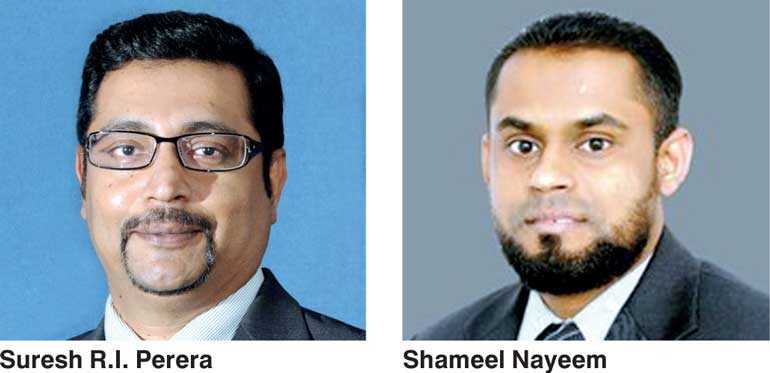Thursday Feb 19, 2026
Thursday Feb 19, 2026
Monday, 18 June 2018 00:00 - - {{hitsCtrl.values.hits}}

The tax law does not exist in a water tight compartment. Its interaction with company law, administrative law and other commercial laws is well known. However tax law is intertwined with Generally Accepted Accounting Principles (GAAP) to such a degree under the new Inland Revenue Act (IRA), in order to grasp concepts of taxation, its influence stemming from GAAP must be comprehended.
It’s a fair statement to make that the tax implications stemming from the new Inland Revenue Act are much more closely interwoven with Sri Lanka Financial Reporting Standards (SLFRS) compared to the previous income tax regime. One may observe concepts and definitions in the new IRA influenced by IMF Model Act are based on international practices, hence much aligned with International Financial Reporting Standards (IFRS). Simple example would be the definition of Finance Lease contained in the new IRA. The phrase bears a strong resemblance to the definition in the SLFRS 16.
On the other hand there are instances where the concepts / definitions in the new IRA which deviate from that of the Accounting Standards too which gives rise to complications in computing the income tax liability.
Financial instruments
The new Inland Revenue Act requires financial instruments held by financial institutions be considered for tax purposes based on the treatment adopted by the Generally Accepted Accounting Principles. The Act requires fair value or mark-to-market followed by GAAP to prevail over traditional tax principles such as ‘deriving, realisation’. Even the distinction based on capital & revenue is relegated to a back stage in this scenario. Commissioner General may even specify another class of persons who may be subjected to tax law in this manner in addition to financial institutions. The Act is flexible too, in that with prior approval, exceptions may be obtained from charging tax based on GAAP.
Leasing
Leasing transactions undergo a significant deviation from the path it has been following hitherto due to changes in the provisions in the new Act. Financial professionals in corporates have to be extra cautious due to implications stemming from the changes for ignorance thereof may result in tax cost of the corporates changing not so favourably for the entity.
Asset Classification and Deferred Tax
A topic that attracted much debate in the current context is the classification of assets for the purpose of new IRA. The Act restricts the definition of Capital Assets used in business and investment assets to specific categories identified in the Act whilst defining Depreciable Assets and Trading Stock too whilst defining Assets in an inclusive manner very widely. On the other hand Sri Lanka Accounting Standard – LKAS 16 refers to Property, Plant, Equipment and Investment Properties dealt in LKAS 40. Deferred Tax addressed in LKAS 12 derive impact from classification of assets.
KPMG will conduct a workshop enlightening the “challenges emerging from SLFRS on the new Inland Revenue Act” on Thursday, 21 June at the Movenpick Hotel Colombo at 8:30 a.m. In this very current and pertinent subject matter the speakers will educate the audience on Capital Assets, Investment Assets and Deferred Tax thereon, besides the Tax treatment on gains or losses recognised in the Other Comprehensive Income Statement (OCI). Moreover, they will be explaining the intricacies in Leases, Foreign Currency Transactions and Financial Instruments. The tax complexities embedded in the new Inland Revenue Act has been enhanced due to the impact from the SLFRS, and there is a great nexus between calculation of income tax liability and the Accounting Standards compared to previous income tax regimes. This interactive and educative workshop will shed light on the finer points and enlighten the nexus between the New Inland Revenue Act and the SLFRS.
The presentations will be conducted by Suresh R.I. Perera and Shameel Nayeem.
Shameel Nayeem, Partner, KPMG is an Associate Member of the Institute of Chartered Accountants of Sri Lanka, an Associate Member of the Association of Certified Chartered Accountants and an Associate Member of the Institute of Certified Management Accountants of Sri Lanka. He had served as a Partner of KPMG in the Maldives, and previously held a number of roles and positions with the Middle East and Sri Lanka offices of KPMG.
Suresh Perera is a multidisciplinary professional qualified in law and accountancy. He is a member of the CIMA Middle East, South Asia and North Africa Regional Board, Deputy Treasurer of Organization of Professional Associations, Chairman of the Tax Committee of the Bar Association and a member of the Accounting Standard Committee of the Institute of Chartered Accountants.
To register for the workshop please contact Bawani Thomson via Tel – 0115426210 or email – [email protected].